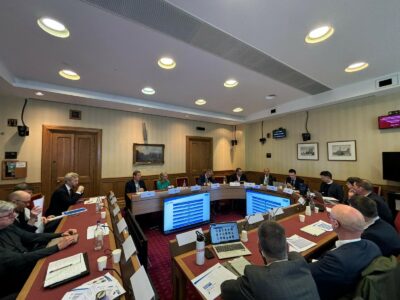
Green Growth
Apr 29 2024
This week sees the launch of the Midlands Energy Security Taskforce, signifying a commitment to harness the Midlands’ energy potential for the benefit of both the region and the country.
Read more
Midlands Engine’s transport arm, Midlands Connect, hosted an online EV conference on Tuesday 1st March discussing key regional developments in the sector.
New research from Midlands Connect suggests that the Midlands is on the brink of an EV boom and could see over 1.7 million electric cars on its streets by the end of the decade. These new projections have been released by Midlands Connect and WSP ahead of its EV conference, taking place on 1st March 2022.
Figures suggest that the Midlands will see a 2,475% increase in uptake in Electric Vehicles by the end of 2030, with projections predicting to rise from 68,725 EVs today to 1,769,855 on its roads by the end of 2030. This means nearly a third (28.4%) of all vehicles registered in the Midlands Connect area could be an electric vehicle by the end of 2030.
WSP forecasts that the Midlands region requires a further 8,909 public charging points in this period to support this increase in EV use.
While local councils have worked tirelessly to improve the city’s EV infrastructure, analysis by Midlands Connect suggests that a £131 million ‘Electric Vehicle fund’ is needed to support them in delivering the public charging points needed this decade. Research predicts that private businesses will fund just over half of the electric vehicle charging points needed on the network (51%), with local authorities expected to deliver the other half (49%).
The conference today will bring together academics, politicians and policymakers to tackle the challenges and opportunities facing the Electric Vehicle industry – examining issues including the need for extra capacity on the national grid to power the EV network; how to support EV charging for those with no off-road parking and how to ensure EV charging points are installed in the right locations.
Commenting on the research Midlands Connect’s CEO Maria Machancoses said:
“We’re on the brink of a boom in Electric Vehicles that could see every third car being an electric one by the end of decade. But more than this, we could also see thousands of new jobs created in the manufacturing, installation and repair of electric vehicles and charging points.
“Local Authorities across the Midlands are doing a great job to roll out charging points, but they cannot do this alone. Government, the automotive industry and private suppliers must all play a part in speeding up the roll out and ensuring councils have the support they need. The Midlands started the industrial revolution and we are trying to make it our mission to make the Midlands the home of the green industrial revolution.”
Giles Perkins, Head of Profession for Future Mobility at WSP, said:
“We are on the cusp of a monumental change in transport and a decisive pivot away from fossil fuel-based transport modes to the age of the electric vehicle. This brings with it several challenges, not least the requirement for large scale deployment of charging infrastructure, which we must ensure provides convenient, equitable and inclusive solutions for all.
“However, this revolution also presents real opportunities for us through green investment and regeneration, new jobs and skills, as well as the benefits of improved local air quality, reduced carbon emissions and a spur to renewable energy.”

Green Growth
Apr 29 2024
This week sees the launch of the Midlands Energy Security Taskforce, signifying a commitment to harness the Midlands’ energy potential for the benefit of both the region and the country.
Read more
Transport
Apr 25 2024
Birmingham Airport (BHX) has achieved Level 3 (optimisation) of the Airport Carbon Accreditation (ACA) scheme for a second year.
Read more
Global
Apr 24 2024
World-leading materials science and technology consultancy Lucideon is targeting international growth with expansion in the Japanese market.
Read more